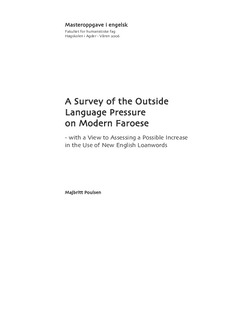| dc.description.abstract | The focus of this work has been on the outside pressure on the Faroese language with an particular view to assessing a possible increase of new English Imports inot the language in view of the present-day technological and media situation.
The theoretical part has been based on some of Milroy`s (2003) theories relevant for sociolinguistic research. A two-month research period provided interviews with 188 Informants. The Informants have been divided into four age groups: 1) young people aged 12 to 19, 2) working force, aged 24-50 with educational background in the home country, 3) working force, aged 24-50 with five years of university studies abroad, and 4) retired people over 65. The Informants were presented with a questionnaire with seven questions, which provided the foundation for a 10-20 minute conversation with each interviewee. The aim has been to identify types of import lexis in each age group and test the youngest group against the others. In addition, gender variation has been mapped for comparison group-wise and across the age groups.
To put a possible new wave of English Imports into perspective, it has been necessary to screen other types of import words in use. They have been labelled Danicisms and Internationalisms according to give definitions. In addition, a selection of Faroese Neologisms has also been screened. All of the aforementioned have been collected to enable analyses of possible variations in choice of lexical items between the groups and between the genders.
As the type of New English Imports is mainly concentrated in the field of computer-related activities, the material is considered too limited to draw any firm conclusion. However, the survey shows that in this field there is a measurable influx of English loanwords amongst the youngest Informants. Hence, due to the daily exposure to the English language, there is no reason to doubt parents` perception of increased use of English in their children`s language.
As a side-effect of the investigation, indications of gender variation have been seen in the material. This may be the first sociolinguistic research project from the Faroese language community which shows such variation of significance. It has been found that the woman of group3 show a higher frequency in the use of Danicisms than the woman in group 2. Although not as prominent for the Danicisms, the frequency of Internationalisms is also the highest in group 3. On the other hand, men across the groups show a tendency to prefer available Faroese Neologisms to import words.
Regarding the New English Import. Danicisms and Neologisms the pattern for the youngest group is the same as for group 3. Thus a larger survey of younger students` preference in terms of Faroese Neologisms versus import words could be of interest in order to screen the impact of education on language choice.
The survey shows the validity of the proposed hypothesis: the Faroese language is under strong pressure from the outside. Thus, the main contribution of the survey to sociolinguistic research in the Faroese community may be to highlight the multifaceted nature of this pressure and a possible influx of new English loanwords in its initial phase. Secondly, there are indications that education creates linguistic stratification. Consequently, an assessment of gender variation and variation between age groups with different educational background could be an interesting spin-off from this survey. | en |
